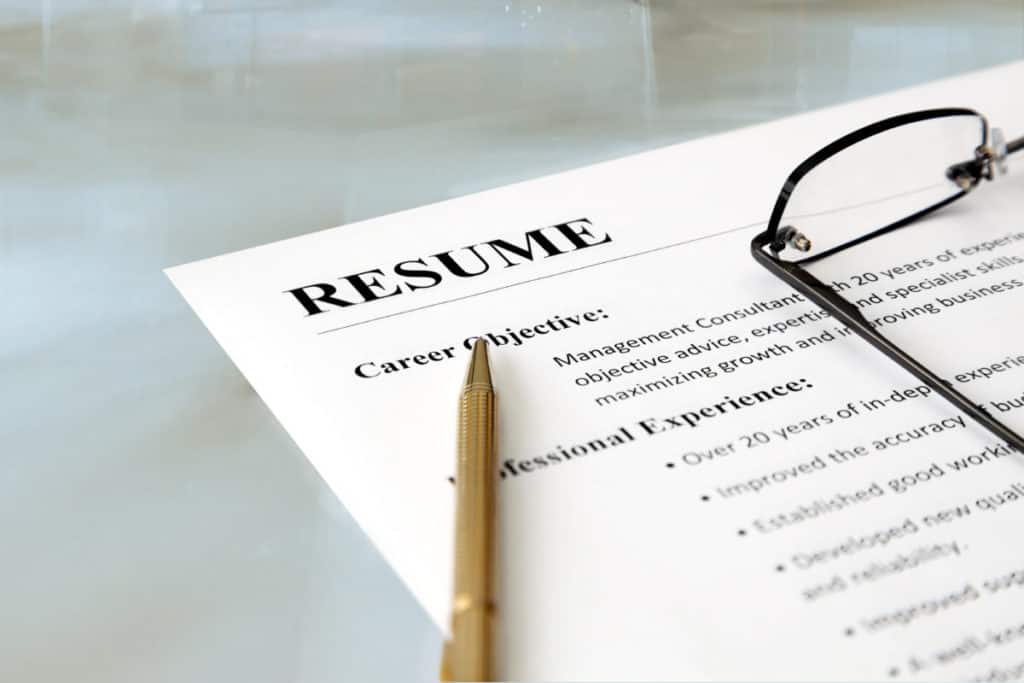If you graduate with a bad GPA, it is easy to catastrophize this and be overwhelmed with what you should do next, but fortunately, a low GPA will not hamper your ability to land a job.
Graduates with a low GPA that want to get a job should leave their GPA off their resume. Many employers do not ask about GPA, so graduates should focus on their strengths. They should also get references, network, and develop their interview skills.
A low GPA matter more for students wanting to go to grad school, but there are things that you can do to help your chances.
Graduates with a low GPA that want to go to grad school should use their essay to explain why their GPA was low and what they learned, get professional experience, and be involved in their field. They should also get a high score on their graduate school entrance exam and prepare for admissions interviews.
To fully understand what you do if you graduate with a bad GPA, first, you need to know if you did graduate with a bad GPA.
Click hereto check out the most popular products for college students.
What would be a bad GPA to graduate with?
As a general rule, a bad GPA would be anything below a 3.0 GPA. This is the GPA that many graduate schools require for admissions.
Most schools require a GPA of at least 2.0 to graduate, and according to a study of over 400 schools, the average college GPA is 3.15.
of over 400 schools, the average college GPA is 3.15.
So while there is no exact answer for “what is a bad GPA” since GPAs vary between schools and majors and what is bad for one student could be really good for another depending on their previous academic history, a GPA below 3.0 often appears as a bad GPA.
If you don’t know your GPA, check out my post on How to Find Out Your GPA During College and After You Graduate .
.
Check out all the benefits of Prime Student. Click here
to sign up for Prime Student.
Does GPA matter after college?
If a graduate with a low GPA wants to get a job after graduation, then it will matter less than if they want to go to grad school. Many employers do not ask a candidate about their GPA. Grad schools are concerned with undergrad GPAs, but GPA requirements for admissions vary, and other experience can help compensate for a low GPA.
A low GPA will not inhibit you from being successful and achieving your goals.
However, the reasons you got a low GPA can be a continuing problem that you should address.
Understand why you had a low GPA
It is important to understand why you got a low GPA so that you can work on those problems before they can impact your professional or personal life as well.
You may already know what caused your poor GPA, such as personal problems (a disability, addiction, family obligation, etc…), poor study skills, or lack of motivation/discipline. Or you may need to do some reflection or talk to someone to understand why you struggled in school.
Either way, consider seeing a therapist to help you get to the root of what hindered your ability to thrive in college and learn strategies and coping skills so that it doesn’t continue to interfere with your life.
Focus on building your life skills for time management, focus, self-discipline to set yourself up for success in the future.
Adjust your mindset, work hard, and stay positive, productive, and persistent!
How to get a job with a low GPA

A low GPA does not put you at a big disadvantage for getting a job. Many employers do not ask or care about GPAs; the degree is all that matters to them.
If they care, it will only be at the beginning of your career (or even just your first job) since employers care about skills and experience.
Don’t include your GPA on your resume
If your GPA was low, do not put it on your resume. GPAs are often not included on resumes. This will not be abnormal or a red flag for an employer that you must have had a terrible GPA.
You want to talk about your strengths, so it is perfectly fine to never mention your GPA. If you are directly asked about your GPA, then utilize the tips discussed in the “How to talk about your low GPA” section.
Hone your strength in other areas
After you graduate, your GPA is beyond your control, so instead of worrying that your GPA will hurt your chances, focus on what you can control:
- Meet with your school’s career center
- Get a list of references and/or letters of recommendation.
- Focus on networking with other professionals in your field.
- Set up informational interviews with people in your field
- Try to find a mentor
- Practice your interview skills
- Improve your communication skills
Highlight your internships or job experience. If you don’t have any experience, then get some. Take a job and work hard. You can build from there.
How to get into grad school with a low GPA

Getting into grad school with a low GPA is much harder than getting a job because grad schools are concerned with your GPA and your ability to succeed in their program.
However, a low GPA does not mean that you cannot get into grad school. Read on to find out what you can do to help set yourself up for success.
Explain why your academics suffered and what you learned
Unlike employers, grad school will undoubtedly notice your low GPA, and you will need to be prepared to explain this. Read the section below on how to talk about your low GPA.
Don’t make excuses, but explain what caused your academics to suffer. If you had personal issues that contributed to your low GPA, such as disability, family obligations, or working, then explain this.
Talk about what you have learned and how you have grown.
Since your low GPA may cause grad schools to question your motivation or discipline, it can be a good idea to also take the time to explain why you want an advanced degree.
You can take advantage of admissions essays to explain your GPA. If your explanation doesn’t fit with the prompt, consider submitting an additional letter explaining your GPA.
Take additional courses
If you haven’t graduated yet, then there are several ways that you can work to improve your GPA, such as
- Grade forgiveness: Take advantage of your school’s grade forgiveness policy which allows you to retake a certain number of courses and replaces your former grade with your new grade.
- Delay your graduation: Take additional courses or pursue a minor to increase your GPA before you graduate.
Learn more about grade forgiveness by reading our guides: Answers to All Your Questions About Retaking College Classes and 5 Reasons You Should Retake Classes (& 6 Reasons You Shouldn’t)
and 5 Reasons You Should Retake Classes (& 6 Reasons You Shouldn’t) .
.
If you have already graduated, taking additional courses could still be a good idea. Some ways to do this are to:
- Get a second bachelor’s degree: Going back to school to get an undergraduate degree in an additional major can be particularly useful if you want to go to grad school for a separate discipline than your major. You have already taken all the general pre-requisites, so you will only have to take the major requirements.
- Take additional courses at a local university: Take courses in your field and aim to get A’s. This will show that you are capable of succeeding in your area of study. This also gives you a chance to develop relationships with your professors (this makes for great letters of recommendation).
- Get graduate certificates: They show that you are dedicated.
Focus on your strengths
If your grades have significantly improved since freshman year or if your major GPA is better than your overall GPA, then highlight that.
Use your application, resume, essays, and interview to show that you have excelled since graduation and gotten past the problems that lead to your low GPA.
Get professional experience
Work experience can help compensate for a low GPA.
Also, letters of recommendation from people in your workplace will help your application.
Be involved in your field
Try to gain any kind of writing or research experience for your field. See if you can be involved in your professor’s research projects.
Become involved in your field. Attend conferences and join groups to network and make connections.
If you are able to earn awards or publish in your subject, this will compensate for your low GPA even more.
Do good on your graduate school entrance exam
High test scores on your entrance exams (GRE/GMAT/ LSAT depending on what kind of graduate school you want to attend) show that you are dedicated, intelligent, and have the skills that are necessary to study and succeed.
Prepare for admissions interviews
Do practice interviews so that you are prepared to ace your admissions interview.
Research potential schools
Grade schools have different requirements. Some schools expect a 3.5 GPA and others a 3.0 GPA. Many have a 2.5 minimum, but some have no set GPA requirement.
Look for colleges that accept students with a low GPA and/or don’t have a minimum GPA requirement.
and/or don’t have a minimum GPA requirement.
You can also reach out and talk to the school about their policy. Some schools will admit you and enroll you on academic probation.
How to talk about your low GPA
Whether for graduate school or with a potential employer, it is good to be prepared to explain your low GPA.
Follow these 5 rules:
- Be honest. Don’t try to deny or hide your low GPA.
- Don’t make excuses. You made mistakes. Own them.
- Explain the situation. Discuss any personal issues that contributed to your low GPA, such as a chronic illness or other disability, a learning disability, mental health/addiction struggles, being a family caregiver, or working full-time while going to school. This isn’t making excuses but explaining the extenuating circumstances so that the person has the full picture. If your GPA was low because you partied too much or didn’t study and do your schoolwork, then admit that.
- As soon as you have been honest about why your GPA suffered, immediately talk about what you have learned. Discuss how you have learned to deal with those extenuating circumstances so that they will not impede your success again, or highlight how you have grown up and developed the skills needed to ensure that you can now take your job/studies seriously.
- Identify the skills you gained in school that will be relevant to the current job/grad program—end by focusing on your strengths.
Think about your situation and the skills that you learned in advance so that if you are asked about your low GPA, you are prepared with an honest answer that admits your mistakes and highlights what you learned and your skills.
Now you know what you should do after you graduate with a bad GPA, why you need to understand why your GPA was low, how to get a job or get into grad school, and how to talk about your bad GPA.


